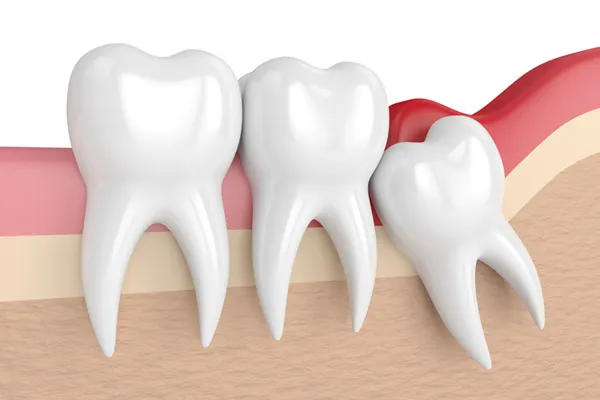Wisdom Teeth

Fort Worth, TX
Wisdom teeth are the third and final set of molars that people typically get between the age of 18 and 25. These teeth are the largest in our mouth, so oftentimes our jaw does not have sufficient space to allow them to come out correctly. As a result, wisdom teeth often get stuck in the gums and result in a number of complications.
Even though our priority is always to save your teeth, some dental problems can only be solved with tooth extraction. At HomeTown Dental, Fort Worth (Sycamore), Dr. Guram may recommend the surgical removal of wisdom teeth if they become problematic.
Complications Regarding Wisdom Teeth
Many people complain of the following issues related to wisdom teeth:
- Since wisdom teeth are the last set of molars, they grow far back in the mouth where there is not enough room for them to grow. As a result, they come out tilted or become trapped in the gums. This condition is very painful.
- Wisdom teeth are also particularly vulnerable to tooth decay since they can be difficult to clean because of their position in the mouth. As a result, plaque may accumulate, leading to tooth decay and gum disease.
- If your wisdom tooth is coming out at an angle, it may damage the tooth nerve of the adjacent molar on its way up. This can result in deep-rooted infection.
- Impacted wisdom teeth can also result in an inflammatory gum condition known as pericoronitis.
- Impacted wisdom teeth can also result in cyst formation in the jawbone. This cyst can fill with pus that can damage the gums, nerves, and jawbone.
Surgical Extraction Of Wisdom Tooth
Most of the time impacted wisdom teeth will need to be extracted surgically. At HomeTown Dental, Fort Worth (Sycamore), we will perform a dental exam and use dental x-rays to determine the exact position of the wisdom tooth. We will then administer local anesthesia to numb the area around the wisdom tooth. If you are prone to anxiety, we may also give you a mild sedative so that you remain comfortable during the surgery.
We will make a small incision in your gum to expose the underlying wisdom tooth and remove the surrounding bone structure with the help of fine instruments. Because of the tilted position of the tooth, we may also need to split the tooth into two or more pieces so that it can be removed easily.
Once the tooth is extracted, we will clean the surgical site of any debris. We may also use dissolvable stitches to suture it closed, in some cases.
What To Expect After A Wisdom Tooth Surgery
Once the tooth is extracted, you will feel some slight pain and swelling on your face. This discomfort may be alleviated in one to three days. Meanwhile, we may give you over-the-counter medication to manage any discomfort. You can also use a cold compress to bring down the swelling.
Some people may also experience:
- A painful condition known as dry socket, which happens if the healing clot is dislodged prematurely.
- Damage to the tooth nerve which results in a tingling or numb sensation in the jaw.
- Infection in the healing socket, resulting in bleeding and fever.
These conditions, however, are quite uncommon and can be easily remedied by us.
In some cases, wisdom teeth do not result in any adverse effects. However, if they show any sign of trouble, it is best to have them removed. If you have pain and swelling in your wisdom tooth, make sure to schedule an appointment with us by calling at (817) 224-2251 so that we can conduct a dental exam and see whether we need to extract your wisdom tooth.
To ensure the continued health of your mouth, we strongly advise you to schedule routine dental and periodontal care appointments with us.
